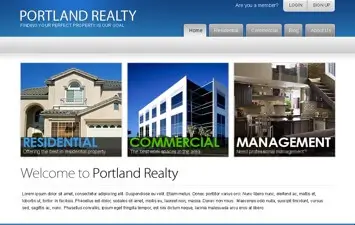Not Just Any Website
Not all business websites are created equal, either in terms of quality or function. Take a step back and you’ll realize that the real estate industry has a very particular model for its commerce.
You have a lot of professionals competing for a lot of customers, all of whom are trying to either buy or sell one extremely expensive product, which they hope to only do once. Though that product falls into a few basic categories, it isn’t by any means standard, and it isn’t stocked in one central location. Instead, it’s just sitting out in the open for everyone to see. Even more bizarre, multiple businesses can be involved in that product’s sale.
Clearly, selling homes isn’t like selling clothes or subscriptions to a DVD-by-mail service, and that affects what you use to build your website. There are a lot of different platforms and professionals out there for web design. All of them have their specific focus, their strengths and weaknesses, and you need to do some thinking about which is right for you.
Power vs. Ease
To illustrate, let’s consider two popular platforms: WordPress and Tumblr. Both are used to build blogs, but each has a different flavor. Tumblr’s guiding principle is ease of use. Setting up a site is free, quick, and incredibly simple, and it’s easy to customize.
However, by focusing on simplicity, Tumblr sacrifices versatility. In reality, Tumblr is more of a “microblogging” platform; it’s one of the most effective ways to post one small nugget of content at a time—a photo, a link, a video, a quick thought—but it’s not designed to do much else, which makes it a bad option for building a real estate website. WordPress, on the other hand, has infinitely more features and is meant for building web pages with a higher volume of varied content.
Still, to make use of WordPress’s more advanced elements and capabilities, you’ll need to be able to write and manipulate code. For most of us, that means hiring someone else to do the construction. With that in mind, the same advice that goes for choosing your software or platform goes double for the person using that software.
We have nothing against your nephew. We trust that he’s Internet savvy. But this is not a personal website for you to post funny pictures of your cats. As we’ve mentioned before, your site has a very specific purpose: to generate leads. Therefore, you want to make sure the vendor you choose is skilled and experienced in building websites that achieve that purpose.
Choosing Your Designer
When considering a prospective designer, ask to see examples. Even if you don’t know much about fashioning a website, you’ve used the Internet enough to know what looks professional and what doesn’t. Next, check references.Make sure the designer’s past clients were satisfied not just with his product, but also with how long it took to finish and how much hand-holding he needed to meet their specifications.
Finally, make sure that the vendor you’ve chosen can give you everything you need. Open source solutions allow you to switch vendors and services easily, but that doesn’t mean you should mix and match. To begin with, most vendors don’t do just one thing. (They wouldn’t be very successful if they did.) That means by using multiple designers or applications for the same project, you’ll end up wasting money on redundancies.
Furthermore, using multiple designers or applications on the same project means they’ll have to communicate with each other in order to mesh. Designers won’t be happy about this, and applications may have a hard time doing it. Your website will be breaking constantly as each different solution steps on the toes of another.
Fortunately, overcoming all of these obstacles is simply a matter of research. Put in the time to figure out what you’re looking for and who can deliver. Your customers will thank you for it.






